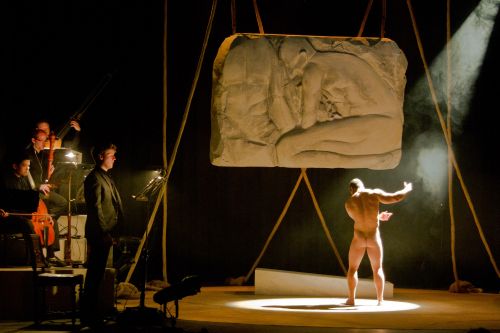 United Kingdom Marton Illés, Rajzok IV for string quintet: Signum Quartet [Kerstin Dill (violin), Annette Walther (violin), Xandi van Dijk (viola), Thomas Schmitz (cello)], Pittville Pump Room, Cheltenham, 11.7.2013. (RJ)
United Kingdom Marton Illés, Rajzok IV for string quintet: Signum Quartet [Kerstin Dill (violin), Annette Walther (violin), Xandi van Dijk (viola), Thomas Schmitz (cello)], Pittville Pump Room, Cheltenham, 11.7.2013. (RJ)
Charlie Barber, Michelangelo – Drawing Blood: Sound Affairs, Parabola Arts Centre, Cheltenham, 11.7.2013 (RJ)
Michael Zev Gordon, The Gleam of Hidden Skies, Toby Spence (tenor), Richard Watkins (horn), City of London Sinfonia / Stephen Layton (conductor), Town Hall, Cheltenham, 14.7.2013 (RJ)

( credit Phil Stapleton)
Over the past week or so Seen and Heard has given extensive coverage to the Cheltenham Music Festival, and to some readers this may appear to be “a review too far”. However since Cheltenham prides itself on the promotion of new music, I have no qualms about reporting on three works which have “escaped” the net until now.
First, a work by Hungarian composer Marton Illés, played by the Signum Quartet who are members of the current crop of BBC New Generation Artists. For most of the Festival these four Rhinelanders have blended seamlessly with other musicians in the Schubert String Quinte tand the Mozart Clarinet Quintet; but with Rajzok IV they were on their own and had their technical skills tested to the limit.
The composer is a keen advocate of polydimensionality, an excessive form of polyphony utilised by Elliott Carter, Ligeti and others. The piece opened with a slow succession of whispering harmonics but then the sounds became more distinct erupting eventually into the spiky rhythms and patterns of accentuation found in his native tongue. A sequence of complex layered polyphony resembled the sounds of a frenetic bee-hive in this fascinating, challenging work – certainly the most “modern” of any premièred in the Festival.
Michelangelo: Drawing Blood was not quite receiving its première; this was the final stop on a short tour that Sound Effects have been making with it. Having attended Charlie Barber’s Salomé, the succès de scandale of last year’s Festival, people were obviously keen to see Barber’s latest offering in which he turns his sights on a famous Renaissance artist inspired by his sketches for the unfinished fresco The Battle of Cascina. To quote the programme notes: “It probes the forces that drove his (Michelangelo’s) genius – an obsession with human anatomy, a passionate response to the male body and an equally intense Christian faith.”
The production featured dance, film and music – the latter played mainly by an ensemble of period instruments (complete with theorbo, dulcimer and viola da gamba) and sung most expressively by counter-tenor James Hall. While the music was splendid, some of the other aspects were irritating and distracting. The slow motion dancing of Aaron Jeffery and Stefano Giglioni (one of them nude) to choreography by Andy Howitt was tastefully done, even in the homo-erotic bits, but soon started to pall. Barnaby Dicker’s obscure avant-garde visuals were a distraction; instead of clarifying the action they tended to obscure it. The screen would have been put to better use displaying the titles of the different sections of the work.
The final concert of the Festival featured the premiere of The Gleam of Hidden Skies by Michael Zev Gordon, a regular visitor to Cheltenham. It uses the same forces as Britten’s Serenade for Tenor, Horn and Strings which had been performed in the first half of the concert. I had the impression that Toby Spence was losing his voice by the end of the Britten, but he returned to the stage after the interval looking as fresh as a daisy to give a performance which was like a shot of fresh air in a particularly sultry evening. (Perhaps he had managed to dose himself up with Cheltenham spa water in the interval?!)
Zev Gordon uses a William Blake poem, just as Britten did in the Serenade, but there the resemblance ends. He uses Byron in preference to Tennyson and brings in three 20th century poets – Larkin, Rosenberg and e e cummings. Byron’s My soul is dark gave notice that a troubled inner world would form the backdrop to the sequence. Larkin’s What are days for? may start off innocently but becomes darker and more agitated, while Blake’s A Poison Tree has a nightmarish quality especially when the horn whoops with delight when the tree of wrath bears an apple. Rosenberg’s Have we sailed? develops a certain serenity during the course of its three verses. You are tired (by e e cummings) might well have summed up the feelings of all those who had attended the Festival on a regular basis. However, it ended on a nocturnal high:
“I’ll blow you that wonderful bubble, the moon,
That floats forever and a day.”
Michael Zev Gordon always has something interesting to say and his latest work was in no sense overshadowed by Britten’s Serenade. Toby Spence and master-hornplayer Richard Watkins gave it a first performance that many a composer would die for.
Roger Jones